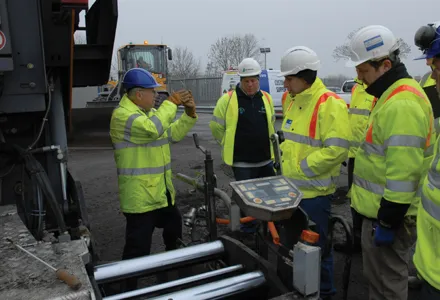
The UK’s Highways Sector Council has launched a toolkit to help road owners, designers, contractors and supply chains manage carbon emissions in their infrastructure.
The tool is available now and includes a ‘readiness survey’ to help users understand where their organisation sits on a scale of alignment to the PAS 2080 standard.
The Highways Sector Council is a voluntary private and public sector not-for-profit group set up 2019 by the sector in partnership with the Department for Transport. The aim goal is to develop a more collaborative approach for improving skills, innovation, safety, environment, value, investment and delivery models.
The council’s toolkit is a result of a commitment made by the council in November 2022 to meet its own Net Zero Highways plan. The council said at the time that it commits to working collaboratively towards achieving the Climate Change Committee’s balanced pathway to Net Zero, the central government’s Net Zero Strategy and the UK Department for Transport’s Decarbonising Transport Plan.
Given the urgency of the Net Zero challenge the council noted that it would initially focus on reducing those greenhouse gas-producing activities that contribute the most to the whole-life emissions of the highway asset. This includes road user emissions – tailpipe emissions from all vehicles. It also includes capital carbon – embedded emissions from the construction and maintenance of the highway asset, in particular from cement and steel production, and from diesel emissions from plant, equipment and materials transport.
The council said in a written statement that decisions by funders, designers and contractors affect carbon levels embodied in highways assets, particularly from the production and use of concrete and steel, and from the diesel emissions of materials transport and construction plant. “PAS 2080 provides the much-needed framework to bring consistency and focus on reducing embodied carbon regardless of where each organisation operates in the value chain.”
The Department for Transport is urging highway authorities to build PAS 2080 into their operations and supply chains. England’s National Highways has already obtained PAS 2080 certification and is driving the requirement for their key suppliers to implement the standard, noted Stephen Elderkin, National Highways’ director of environmental sustainability.
“We’re pleased to endorse the use of this tool throughout our extended supply chains in line with our stated aim of implementing PAS 2080 beyond our own National Highways accreditation,” said Elderkin. “We look forward to continuing to work with HSC to accelerate decarbonisation across the industry.”
“The highways sector relies on multiple tiers of suppliers all playing an important part in the whole-life value of the built asset,” said Phil Clifton, managing director for highways at the road maintenance division of Balfour Beatty and a council member.
“Endorsing adoption of PAS 2080 down through supply chains is easier said than done,” said Clifton. “Endorsing the use of [the council’s] PAS 2080 support tool is a much more helpful message to suppliers in getting them aligned to the common objective.”









